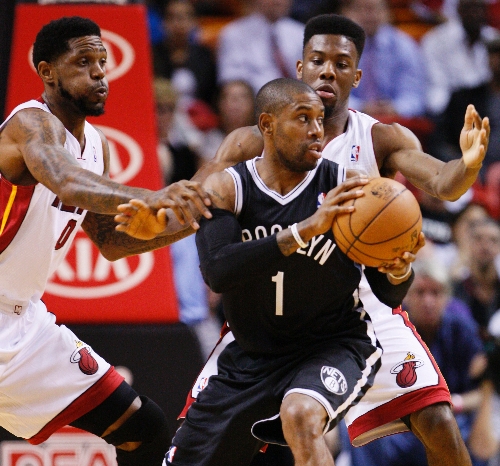Watson steadfast during Nets’ stormy season
NEW YORK - His Twitter handle is QuietStorm_32. But it's only half accurate in describing C.J. Watson's first season with the Brooklyn Nets.
Stormy? Certainly. Quiet? Definitely not.
The 28-year-old former Bishop Gorman High School star couldn't have predicted what has transpired since he left Chicago, a scapegoat for the Bulls' early playoff exit who joined the Nets as a free agent.
How could Watson, a six-year NBA veteran, know he would wind up living in a hotel after his New Jersey condominium lost power as a result of Hurricane Sandy? How could he predict his coach would be fired 28 games into the season or that his new team would still be struggling to define his role almost halfway through the season?
"You never know what you're going to get into when you sign," Watson said last week before playing his first game for interim coach P.J. Carlesimo. "You're just along for the ride."
So far, the ride has been wilder than the famous "Cyclone" roller coaster in Coney Island.
Last May, Watson was taking heat for being too unselfish and being blamed for Chicago's first-round playoff loss to Philadelphia.
With the Bulls clinging to a one-point lead in the final seconds of Game 6 and looking to extend the series, Watson made the most elementary of basketball plays - hitting the open man, Omer Asik, who was three feet from the basket.
Asik was fouled, and the 7-footer from Turkey, a 46 percent free-throw shooter, missed both attempts from the line.
With 2.2 seconds left, the 76ers' Andre Iguodala made two free throws, and Philadelphia advanced with a 79-78 win.
Bulls fans and the media piled on Watson, an 82 percent free-throw shooter, for not holding on to the ball and getting fouled himself.
"It was the right play, but it just didn't work out," Watson said, though he asserted he'd been fouled twice on the possession but got no call. "They had to point the finger at someone. You live and you learn. But I knew after that I wasn't coming back" to Chicago.
FRESH START
The Nets were looking for a backup to star point guard Deron Williams, and Watson was an ideal candidate. He'd done a good job backing up Derrick Rose for two seasons in Chicago, and he also was affordable, costing Brooklyn about $2 million for the two years.
"I was excited about the move," he said. "I saw it as a fresh start for me."
It was supposed to be a new beginning for Watson and the franchise. The Nets had a new arena, the $1 billion Barclays Center. They had high-profile owners, Russian businessman Mikhail Prokhorov and rapper Jay-Z. And general manager Billy King revamped the roster, re-signing superstar Williams but dumping 11 players and signing free agents such as sharpshooter Joe Johnson and Watson. Coach Avery Johnson predicted an NBA title.
But just because a basketball is round doesn't mean it can't take funny bounces, as Watson soon discovered. The Nets started slowly and were below .500 when Avery Johnson was fired Dec. 27.
The coach was still trying to find the best way to use Watson's talents when he was let go. Mostly coming off the bench, Watson is averaging 6.3 points and 1.7 assists in 18.2 minutes - slightly below his career averages. But Watson said he had no problem with Johnson.
"He was very fair to me," Watson said. "They were still trying to define what my role was. They were trying to see when me and Deron could play together. Hopefully, we can get it together and go out there and win some games."
Carlesimo, 3-1 as the interim coach, has the same challenge.
Watson bruised his right knee Monday in a blowout loss to San Antonio and missed his first game in Wednesday's win at Oklahoma City. Watson is expected to be available when the Nets (17-15) play at Washington tonight.
"As a veteran, you learn how to roll with things," Watson said. "I think I'm playing OK. I'm still learning the system. I don't know if he is going to change anything but P.J.'s a smart guy. He's been in this position before. He'll know what to do."
Watson had been to Brooklyn before signing with the Nets and thought it would be a good place to play. But he said he was caught off-guard by the resounding reception the Nets have received.
"It's been pretty cool," he said. "You can see there's a blue-collar spirit and you try to take that to the court with you. The fans are real supportive and very knowledgeable about the game."
STORM DAMAGE
On Oct. 29, basketball took a back seat as Hurricane Sandy pounded New York City, Long Island and New Jersey.
Watson, who lives in Edgewater, N.J., across the Hudson River from Manhattan, was caught up in the superstorm that killed hundreds, displaced tens of thousands and caused billions of dollars in damage.
"It was pretty scary," he said. "I had lost power for a couple hours. Then it was a day. The next thing you know, it was two days, three days and I had to move to a hotel."
With streets flooded, power out and public transportation immobilized, the Nets' much-anticipated Nov. 1 home opener against the New York Knicks was postponed.
"It was really scary to see what the people were going through without any food or any power," Watson said. "You're watching the news and people were losing their homes. I considered myself lucky."
In the aftermath of Sandy, Watson's Quiet Storm Foundation joined in the relief effort. Clothes, food and toiletries were collected and distributed last weekend to about 500 families in Coney Island, which was hit hard by the hurricane.
"We're trying to help people who are still hurting," he said. "It's all about giving back."
Watson began his foundation when he joined the NBA in 2007. His annual summer basketball camps in Las Vegas have been well attended and his rising visibility in the league has helped attract sponsors.
"People know who I am now because the Bulls were always on TV," he said. "Long term, I'm hoping we can give out a lot of scholarships and try and build a rec center (in Las Vegas)."
Often, Watson's biggest challenge is his game-night commute from New Jersey to Brooklyn. The Nets still practice in New Jersey and fly out of Newark Airport, so it's more practical for Watson to live there. His commute can be as quick as 30 minutes or over an hour, depending on traffic and weather.
"It's pretty tough," Watson said. "The (Lincoln) tunnel's always packed. You have to be prepared. You never know when you are going to have an accident to deal with, so it takes a lot of planning."
And a lot of patience. Much like coming off the bench does, regardless of who the coach is that night.
Contact reporter Steve Carp at scarp@reviewjournal.com or 702-387-2913. Follow him on Twitter: @stevecarprj.


















